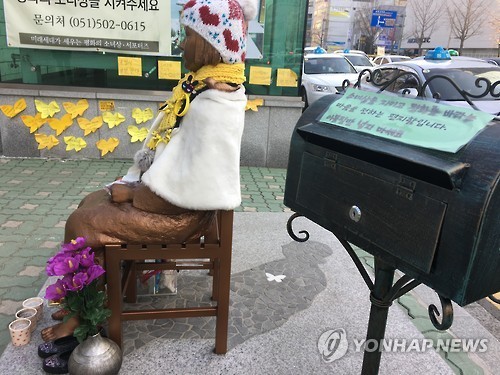Japan to decide on envoy's return after 'comfort women' statue relocation
By KH디지털2Published : Feb. 26, 2017 - 16:41
Japan will decide when its top envoy will return to Seoul after seeing whether a statue symbolizing the victims of Japan's wartime sexual slavery will be relocated in Busan. The move followed the delivery of an official letter from South Korea's foreign ministry to municipalities asking for the relocation, Japan's public broadcaster NHK said Sunday.
South Korea's foreign ministry said Thursday it sent the letter to the Busan regional government, the city's dong ward office and the Busan municipal assembly to resolve the diplomatic rift with Japan over the statue. The ministry said that the location of the statue is not desirable given the safety for overseas missions and international courtesy and manners.

In December, civic groups installed the statue in front of the Japanese consulate in the nation's second-largest city. Japan demanded an immediate removal and recalled its ambassador to South Korea in protest last month. The envoy has yet to return to his post.
South Korea and Japan reached a deal on Dec. 28, 2015, under which Tokyo apologized and agreed to provide 1 billion yen ($9.4 million) for the creation of a foundation aimed at supporting the victims, euphemistically called comfort women.
Tokyo argues that installing such statues including the one in front of the Japanese Embassy in Seoul is against the spirit of the deal aimed at resolving the issue "once and for all."
According to NHK, Japanese Foreign Minister Fumio Kishida said Friday the South Korean government has expressed there is no change to its position that it will steadily implement the agreement, adding that Japan will seek to have Seoul do so.
Kishida's remarks are interpreted as Tokyo's stance that it will wait for South Korea to have the statue removed.
"South Korea's move has yet to meet Japan's expectations over the implementation of the deal," an official at Japan's foreign ministry was quoted by NHK as saying, apparently stressing the importance that South Korea will manage to have the statue removed.
Japan's wartime sexual slavery has been a major source of a diplomatic rift between Seoul and Tokyo. Historians estimate that up to 200,000 women, mostly from Korea, were forced into working at Japanese army brothels during World War II. (Yonhap)


















